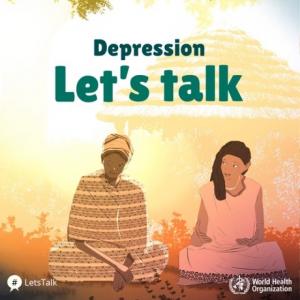Talking about depression in Sierra Leone
FREETOWN, April 7th 2017 --- On World Health Day, the Government of Sierra Leone, the World Health Organization, the Mental Health Coalition and partners are calling for urgent action on depression in Sierra Leone, which affects at least 240,000 people in the country every year. Stigma and lack of accurate information on mental health issues are critical impediments to treatment and recovery, health experts say.
The theme of this year’s World Health Day, which falls on April 7th, is Depression: Let’s Talk (‘leh wi tok bot pwelhart!’). Depression is now the leading cause of ill health and disability worldwide, according to the World Health Organization. Over 320 million people suffer from the condition globally each year. The majority of these cases go untreated, which can have devastating consequences for those affected. At its most severe, depression can lead to suicide, which tragically, claims 800,000 lives annually.
Dr. Alie Wurie, Director of Noncommunicable Diseases and Mental Health at the Ministry of Health and Sanitation urged Sierra Leoneans to be more open about mental health and do everything in their power to fight stigma against people affected. “At some point in our lives, mental health issues will almost certainly affect us directly or someone we love, yet they are rarely talked about. We need to change this! We must encourage those struggling with mental illness to come forward for help, and offer our support.”
“We cannot have wellbodi without mental health,” said Dr. Florence Baingana, Mental Health Officer at WHO Sierra Leone. “Depression is now the top cause of ill health globally, and it brings untold distress to those affected. The prevalence of this condition is a wakeup call which tells us that we need to talk more and act more on mental health, and ensure that people with depression get the support they so urgently need!”
Depression is a common mental disorder, clinically defined by feelings of persistent, sometimes extreme sadness that last for more than 14 days; a loss of interest in activities that are normally enjoyed, as well as a reduced ability to carry out daily activities. Other symptoms can include feelings of guilt or low self-worth, disturbed sleep or appetite, tiredness, and poor concentration.
Depression can undermine someone’s ability to function or engage at school, work or in the community; it can cause immense suffering, and at its worst, can result in self-harm or suicide.
In Sierra Leone, mental health services are now available in all districts, with Mental Health Nurses stationed in almost all district hospitals. With support from WHO and partners, health workers are also being trained to do basic counselling for those with common mental health disorders and where needed, provide referrals for more complex cases. Such services are free and confidential and for many people, provide critical pathways to recovery.
“As there is life after Ebola, there is hope after depression,” said Paul Kaikai, a representative of the Mental Health Services Users Group in Sierra Leone. “Care and support from the family and community, combined with effective, respectful treatment from health workers can bring dignity, healing and ultimately recovery to those battling mental illness.”
“Stigma and lack of awareness about mental health issues are critical barriers for delivering effective mental health care,” said Edward Jah from Sierra Leone’s Mental Health Coalition, a consortium of NGOs working on mental health issues in the country. “There must be continued advocacy to reach communities with accurate information on mental health, so that people know that these issues are real, that there is treatment available, and provide hope for those in need.”
“Mental illness is nothing to be ashamed of and we need everybody to know this,” said Mr. Lansana Conteh, Programme Manager for the Health Education Division at the Ministry of Health and Sanitation. “Communities play a vital role in tackling misinformation and building trust and solidarity, so that those in need know what to do and who to turn to, and feel confident to reach out for help.”
World Health Day itself has been commemorated around the country with various events in Freetown and all 14 districts, including an essay and painting competition through school health clubs; radio discussions; community forums, and a national event and parade in Freetown.
Mental health programmes are being implemented in Sierra Leone with support from a range of partners including WHO, the Mental Health Coalition, USAID/JSI, the Sierra Leone Red Cross, IsraAid, International Medical Corps, Kings Health partners, the African Development Bank and Caritas/Harvard School of Public Health, as well as various community-based organizations.
Contacts
At the Ministry of Health and Sanitation: Kadrie Koroma, kadriekoroma [at] yahoo.comtarget="_blank", +232 7667 2962
At WHO: Laura Keenan, keenanl [at] who.int, +232 786 33952




